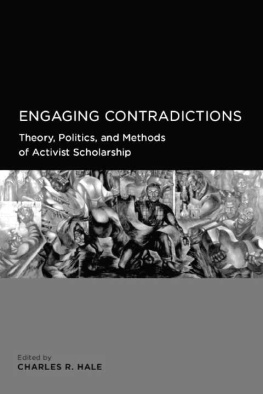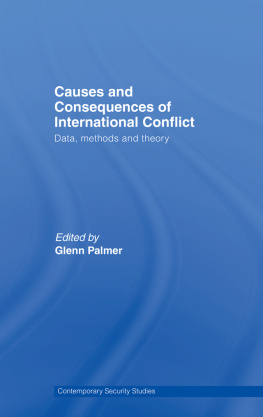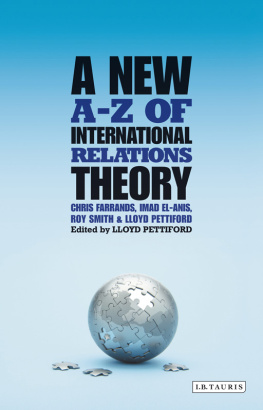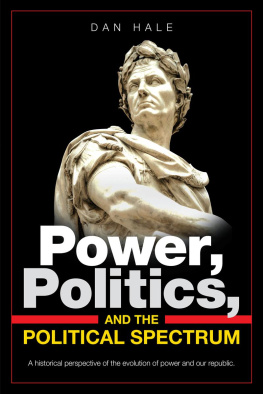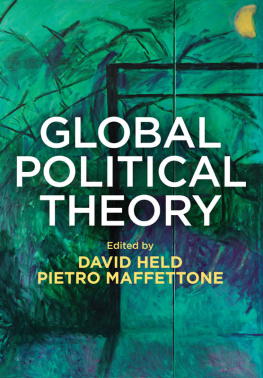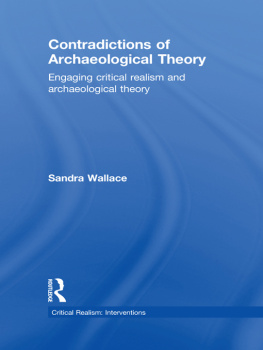Edited by
CHARLES R. HALE





For Michael Zinzun in memoriam


This volume has been a collective project throughout, and I am deeply grateful to all those who contributed to its realization along the way. It was first conceived within the now defunct Committee of the SSRC- MacArthur Program on Global Security and Cooperation (GSC), which also provided core financial support. The two GSC Program Officers, Itty Abraham and John Tirman, supported the idea throughout, as did many of the Committee members, especially Dani Nabudere, Francis Loh, Daniel Garcia Pena, Mary Kaldor, and Yezid Sayigh. The workshop in Los Angeles during which the volume first took shape was graciously hosted at the offices of the Coalition Against Police Abuse (CAPA). Special thanks to Joao Vargas and especially Michael Zinzun, CAPA's director (now deceased), for making this possible. Abriendo Brecha, the annual conference on activist scholarship at the University of Texas, provided speaking venues for Ruthie Gilmore and George Lipsitz, who presented papers that grew into the chapters published here. I am especially grateful to Vivian Newdick, whose careful editorial hand helped immensely in the final preparation of the manuscript, and to Mariana Mora for her eleventh-hour work on the Appendix. Les Field and M. Brinton Lykes provided thoughtful and constructive feedback on every chapter, with a level of care that one always hopes for but rarely achieves in these endeavors. Elisabeth Magnus, our copy editor, toiled valiantly to make our prose read well, and in so doing, showed a keen understanding of the substantive contents of our work. Finally, we all have an enormous debt of gratitude to Nathan MacBrien, GAIA's publications director, for seeing the promise in this project early on and for providing sage advice at every stage that has helped us to fully realize its potential.
C. R. H.
We hope that this book will be used not only for its theoretical and empirical insights but also as a resource, for inspiration and for guidance, by those who are carrying out activist research or who aspire to do so. Toward this end, we have prepared an online appendix, meant to be a guide to organizations, networks, and the like that work in this field. Interested readers may find it alongside the online version of this book, at http://repositories.cdlib.org/gaia/gaia-books/6/.
The appendix is intended to provide activist scholars with the names and contact information of activist research centers in North America, Latin America, Asia, Africa, Oceania, and Europe, as well as to give a general sense of the types of areas in which research has been combined with concrete community action. The guide is not intended to be exhaustive but rather representative of the different types of activist research initiatives currently under way.

Activist scholarship is as old as Machiavelli and Marx or indeed Aristotle. The social sciences developed partly in and through activist scholarship. The classical political economists of the early nineteenth century did not simply observe the effects of mercantilism, they campaigned for the repeal of the Corn Laws. Sociologists at Hull House and the University of Chicago not only studied migration, they pressed for changes in legislation and local administration and through the settlement house movement engaged in direct action. Anthropologists have lately engaged in much soul-searching over complicity in colonialism, but anthropology was also recurrently the basis for efforts to mitigate harmful colonial practices. If early anthropology was shaped by racial thinking, modern anthropologists have been widely committed not only to intellectual criticism of the use of the race concept but to action to end racism.
That knowledge is vital to social action-as to individual ethics-has long been recognized. Thinkers have been doers (contrary to stereotype). And reflection on successes, failures, and unexpected consequences of social action has been a vital source of new understanding.
Yet activist scholarship often seems an unusual or surprising idea. It isn't widely taught in textbooks. Tenure committees are unsure how to think about it. Why should this be so? Three reasons seem especially influential: (1) modern science (and modern epistemology more generally) has developed an ideal of knowledge based on detached, objective observation; (2) the university has come to contain a much larger proportion of scholarship than in the past (though perhaps not as big a proportion as academics believe), and thus scholarship is more contained with "academic" agendas and career structures; and (3) activism is widely understood as directly expressive of individual interests, or emotions, or ethical commitments rather than of a broader, more reflective, and more intellectually informed perspective on social issues.
Nonetheless, activist scholarship is of vital importance, as the chapters in this book suggest. The importance of social science to social action is not limited by discipline. Neither is the potential for improving social science by learning from and through activism.
The Social Science Research Council (SSRC) has for more than eighty years sponsored and organized projects to improve the quality and creativity of social science and to connect it better to public issues and concerns. Many SSRC projects have had little to do with broader social activism; they have focused on improving research methods or theories, on building better linkages across disciplinary boundaries, or on ensuring integrated scholarly attention to major world regions. But the SSRC has also mobilized academic experts to inform the policy processhelping, for example, to create the U.S. Social Security system and shaping approaches to economic development in the mid-twentieth century.
Occasionally SSRC projects have sought to put issues on the policy agenda that weren't yet the focus of policy makers' attention or to change the way issues were understood in public debates. In the iggos, for example, the SSRC was active in developing new ways of thinking about "peace and security" that complemented previous concerns regarding conventional warfare and nuclear arms races with new attention to international immigration, environmental degradation, food supplies, ethnic conflicts and genocides, and gender-based violence as basic dimensions of "human security." Grasping the connections among these different topics required scholars from different disciplines to collaborate; making their knowledge effective required them to communicate not only with each other but with broader constituencies and actors in various practical domains. It was-and is-not enough simply to communicate social science knowledge to policy makers in government. It is important to foster collaboration and communication with those whose work in NGOs, social movement organizations, businesses, legal advocacy, and other arenas that can be improved by social science knowledge-and can challenge social scientists to keep improving their own understandings.

